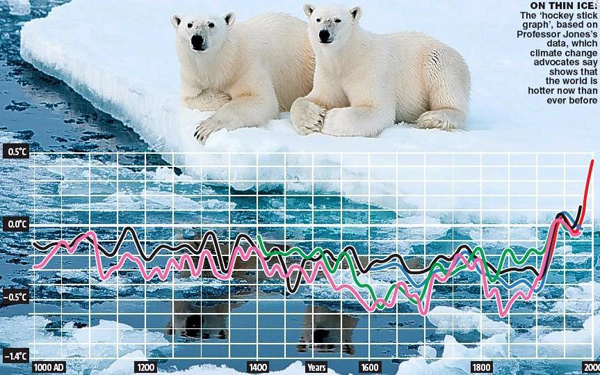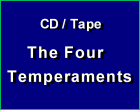Environment
 |
 |
 |
 |
 |
 |
 |
‘No Global Warming for 16 Years’ - Part III
Climategate: Tailored Data to Fit
the Global Warming Agenda
Question: Studies done by Harvard meteorologists have been unable to replicate the extreme scenarios and findings of the IPCC without “data padding.” Has “data padding” obstructed public knowledge of actual temperature trends? Can you explain data padding and other statistical anomalies in global warming discussions to readers? Did the IPCC, in your view, falsify data?
Answer: : The Climategate emails, released from a server at the University of East Anglia in Britain by a whistleblower in November 2009, showed how the authors of the hockey stick and a surprisingly small coterie of other scientists had engaged in practices inconsistent with the scientific method. Not the least of these was refusal to share data with others who wished to verify the results claimed.

Phil Jones: Refused to make data available for other scientists to review
Professor Jones’ refusal to make all of his data and codes immediately available when other scientists requested them had long raised concerns, particularly because his results had a direct bearing on the question of how fast the world is warming.
Concealment of freedom-of-information legislation: When the Freedom of Information Act came into force in the UK, Professor Jones and other scientists began writing emails to each other to discuss how they could prevent their codes and data from being made available. Professor Jones’ first advice to fellow-Climategate emailers was that they should not let anyone know that there was a Freedom of Information Act in the UK.
Destruction of data: Professor Jones subsequently wrote to fellow-emailers that he would destroy data rather than provide them to researchers who requested them under the Freedom of Information Act.
Conspiracy to destroy data: In another email, Professor Jones indicates that the University of East Anglia was prepared to connive in the destruction of emails while pretending to preserve them: he discloses how a Freedom of Information officer at the University of East Anglia had told him that he must not destroy any emails, except for the purpose of keeping email traffic manageable. Yet the capacity of the University’s servers is likely to be enough to permit all of the team’s emails to be permanently stored, tracked, and made available on request. Inferentially, the Freedom of Information officer was giving a large hint to Professor Jones and his colleagues that if they destroyed emails he would look the other way.
Circumvention of freedom-of-information legislation: Professor Jones and others then discussed several reasons for not disclosing data and computer programs to anyone who might request them under the Freedom of Information Act:
- Hiding (they repeatedly used the word) behind public-interest immunity;
- Hiding behind the UK’s Data Protection Act, which does not prevent disclosure of data or research paid for by taxpayers;
- Hiding behind advice from the office of the Information Commissioner, the UK official who enforces the Freedom of Information Act;
- Hiding behind the fact that the UN’s climate panel is an international entity not subject to the UK freedom-of-information law,
- Hiding behind reclassification of as much as possible of their work as UN work, so as to evade their obligation by law to disclose requested information; and
- Hiding behind contracts between the Climate Research Unit and other national weather bureaus whose data it had received, on the grounds that weather data might be held by some nations to be confidential.
Discrimination against skeptical scientists in data sharing: Professor Jones then worked with Freedom of Information Officers at the University of East Anglia to minimize the scope, categories, and quantity of information to be disclosed to those requesting it. An email to colleagues describes how Professor Jones had shown the University’s Freedom of Information Officers details of the website of one of those requesting information about how he had compiled his global-temperature dataset, and had persuaded them to agree that the person requesting the data ought not to be given anything if possible. Yet there is no provision in the Freedom of Information Act in the UK that allows any such discrimination.
Refusal to share program code: Numerous emails establish that the scientists who sent them were particularly anxious to conceal from other researchers the computer code they were using to create their global-temperature record. The reason for this refusal is readily discernible from one of the document files also released by the whistleblower, a series of notes by exasperated programmers trying to make sense of the numerous segments of apparently erroneous computer code in the scientists’ programs, and of many data files that were missing, incomplete, unlabeled, duplicated or based on incompatible units of measurement.
Conspiracy to destroy data: Finally, in 2008 Professor Jones wrote to several scientists inviting them to delete all emails relating to their participation in the preparation of the previous year’s Fourth Assessment Report of the UN’s climate panel. He wrote this email some three weeks after the University of East Anglia had received a request under the Freedom of Information Act for precisely the information that he was recommending his colleagues to emulate him in destroying.
Yet not one of the numerous “inquiries” into the Climategate emails ever asked Professor Jones or any of the other emailers whether they had ever destroyed any of the data that Professor Jones had said he would himself destroy and had advised them to destroy. The question was simply not raised.

No solid evidence for Jones' bogus graph ...

Posted November 4, 2013
______________________
______________________











